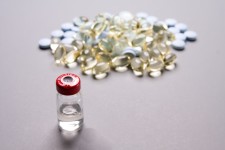
Multi dose therapy vs injectable via shutterstock
ViiV Healthcare, a company seeking "advances in treatment and care for people living with HIV," announced positive results from its trial of a two-drug injectable regimen for the treatment of human immunodeficiency virus (HIV), according to an announcement on its website.
Company researchers found that the intramuscular (IM) injectable drug combination was able to maintain viral load suppression, and the results of its efficacy were comparable to that of an oral three-drug regimen.
For many clinicians, a major issue with treating HIV is patient adherence with anti-retroviral treatment, or ART. When administered appropriately these drugs work well for most, achieving the goal of decreased and even undetectable viral loads. But how can they work if you do not take them, or take them infrequently?
Non-compliance makes HIV treatment considerably more difficult, as it allows the virus the opportunity to adapt, thereby creating the issue of drug resistance. For patients who complain that the root of their non-compliance is due to the burdensome task of taking (or remembering to take) three or four pills per day, a once-monthly or twice-monthly injectable form of the ART may prove to be the solution.
ViiV Healthcare's Phase IIb trial followed 309 adults over a 96-week period, randomized to three different treatment options: four weekly injections, eight weekly injections, and once-daily oral three-drug regimen.
The injections comprised of Cabotegravir (an integrase strand transfer inhibitor) and Rilpivirine (non-nucleoside reverse transcriptase inhibitor). These drugs have differing mechanisms of action, with the former preventing viral DNA integration into the host genome, and the latter binding to the crucial enzyme reverse transcriptase, thus blocking HIV replication. Patients on the oral therapy were given Cabotegravir and two other drugs which fell under the class of nucleoside reverse transcriptase inhibitors (also known to affect the activity of reverse transcriptase).
In terms of adverse events, the most frequently reported by those taking the four weekly injectables than the other two groups was pain at the injection site, cited by 93 percent of the participants. Taking into consideration the efficacy of the injectables, with viral suppression rates of 95 and 94 percent using the four- and eight-weekly injectables, respectively, compared to 91 percent for the oral drug regimen, one could make a case that the benefits far and away outweigh the risks.
As the company moves toward Phase III of its clinical trials, it is expected that more information will be collected on possible side effects and other adverse events outcomes.


